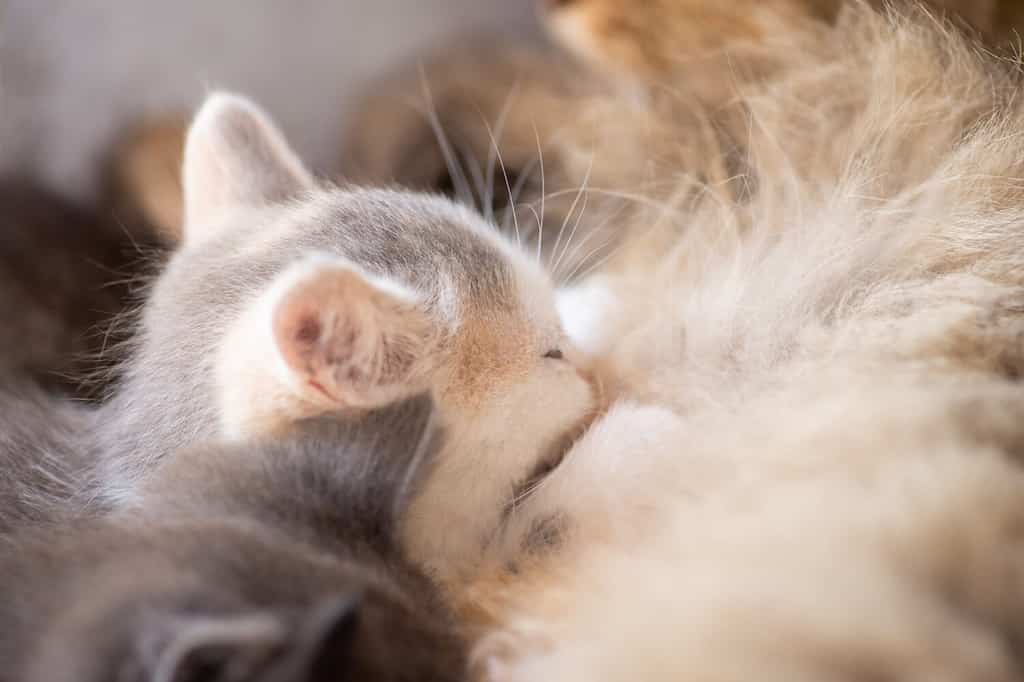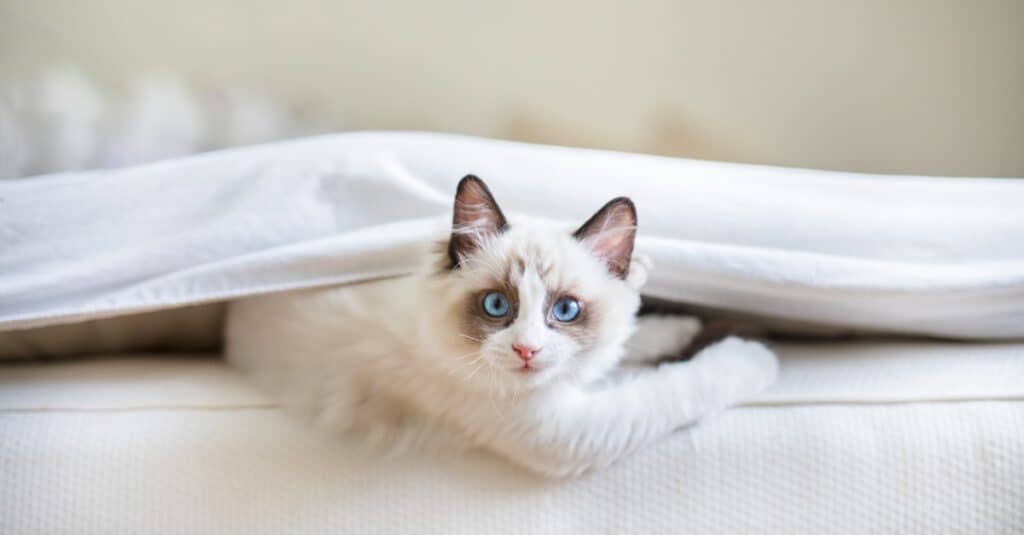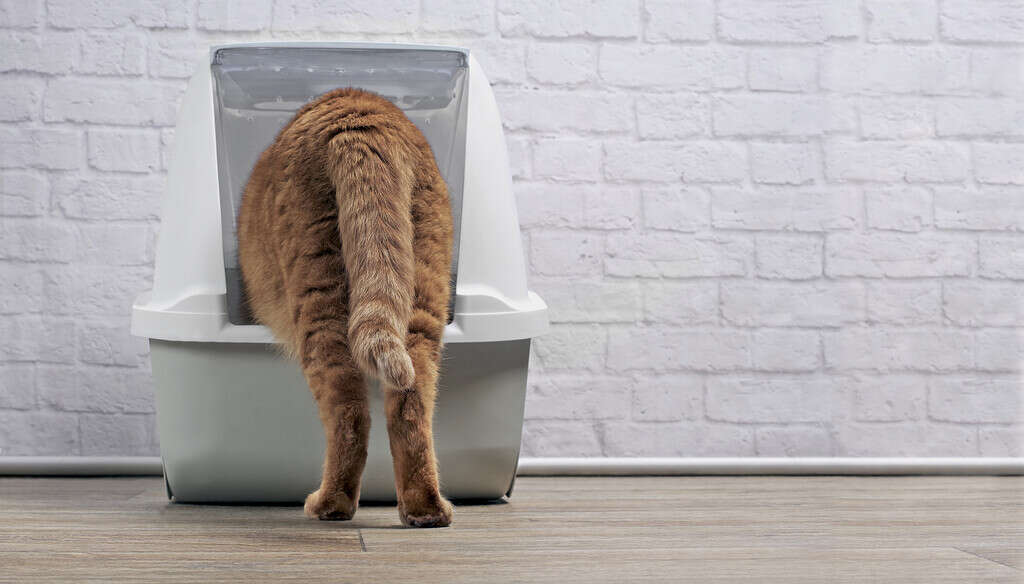From digging in the litter pan to swatting at one another during a fight, our feline friends use their paws for natural and instinctual behaviors. When a cat uses their front feet to paw at your bed, several reasons may be the cause. Some causes of cats pawing at the bed may require a trip to the veterinarian, so pay close attention to your cat if they do this. Let’s explore the paw-sibilities below!
Cats Paw the Bed When Kneading
Depending on the action your cat is doing when they paw at your bed, they may be kneading. Some cats move their feet slightly, but others pick up one front foot after the other as if marching in place. The cat usually stretches their toes out as it presses down and squeezes them inward as the foot moves upward. This natural behavior reminds them of their time as a kitten, kneading their mother’s belly to help the milk flow better. Most cats knead and purr when they feel comfortable and content. Kneading is also a symbol of affection from your cat to you!
Asking for Attention

Kittens use their paws to knead their mothers’ bellies, improving milk flow while nursing.
©Vitalii Stock/Shutterstock.com
If you’re in bed and your cat begins pawing at the blankets, they could be trying to get your attention. Some cats use this method to encourage their owner to shower them with pets and love. They might be missing your presence if you worked long hours that day or have been away on a trip.
On the other hand, this attention-seeking behavior could also be due to boredom. If your cat doesn’t get enough exercise during the day, they might be trying to get you to wake up and play. Consider more play time with them before bed when your cat pawing at your bed becomes a problem or keeps you awake. Cats love to chase and hunt. Using interactive play, such as fishing pole toys, can help wear them out and get them ready for bed!
Making the Perfect Sleeping Place

Your cat may paw at the bed if they want to get under the covers!
©iStock.com/Angela Kotsell
Cats also paw the bed or blankets to make themselves a comfortable place to lay. Some cats are very particular about their sleeping spot and want to make it just right. Pregnant cats about to give birth sometimes paw at blankets, towels, or clothing to draw them into their nest. A comfy sleeping (or birthing) place is very important to cats!
If your cat is cold or just enjoys snuggling under the covers, they might paw at the bed or blankets to allow them to crawl under. Because of their curious nature, they may also just want to see what’s underneath!
Cats Paw the Bed to Mark Territory
If your cat is pawing at your bed, it might be because they need to mark it as their property! Cats have scent glands between their toes called interdigital scent glands. The glands produce chemical smells (pheromones). Although you will never smell the odor, other cats certainly will. In fact, most animals (including humans) create several types of pheromones to communicate with other members of their species. Pheromones are species-specific. That means they only affect or communicate with members of the same species.
Spreading these pheromones is one reason why cats scratch the carpet, furniture, or other places. When they venture outside, they scratch trees, fences, etc. Not only does this help condition their nails, but it also puts the cat’s unique scent on the area, thus marking their territory. They also have these glands around their face and tail. That’s why they rub their cheeks, body, and tail on you and other items.
Litter Box Problems

Cats may paw at the bed if they’re experiencing pain when they urinate.
©Lightspruch/iStock via Getty Images
A huge problem that exists among pet cats is inappropriate urination. This is often the first thing to alert you to a medical concern your cat has developed. Your cat may paw at the bed or other soft surfaces when getting ready to pee on them. Sometimes, that’s because the cat associates the soft item with comfort. They usually choose to go on something soft when using the litter pan suddenly becomes an uncomfortable or painful experience. Cats tend to avoid things that they’ve learned may cause them discomfort or fear.
Cats are prone to forming crystals in their urine when their pH balance is incorrect. This condition (crystalluria) is a common cause of a cat peeing outside the litter pan. These crystals have sharp edges and damage the walls of the bladder and lining of the urinary tract. A cat can also suffer from a urinary tract infection (UTI). Similar to humans, this can cause burning, pain, and even blood in the urine.
If you’re concerned your cat may have a UTI or crystals, it’s essential to take them to the veterinarian as soon as possible. If your cat suddenly tries to pee and nothing comes out, it’s an emergency! A cat who cannot pee will quickly develop electrolyte imbalance, which leads to kidney failure. It’s also possible for the bladder to rupture (explode) and release urine into the body cavity. This can be absolutely devastating and result in death. Urinary blockage is more common in male cats than in females.
Final Thoughts on Cats Pawing at the Bed
Cats are very social and territorial creatures. When a cat paws on your bed, it could be to send you one or more important messages. Some possible reasons can become life-threatening if not treated quickly.
Be sure to observe your cat’s attitude when they paw at your bed. Are they frantic? Have they peed in places they shouldn’t recently? Is your cat happily purring? Answering these questions will help you determine why your cat is pawing at your bed. When in doubt, a trip to the veterinarian is the best option.
The photo featured at the top of this post is © Nils Jacobi/Shutterstock.com
Thank you for reading! Have some feedback for us? Contact the AZ Animals editorial team.







